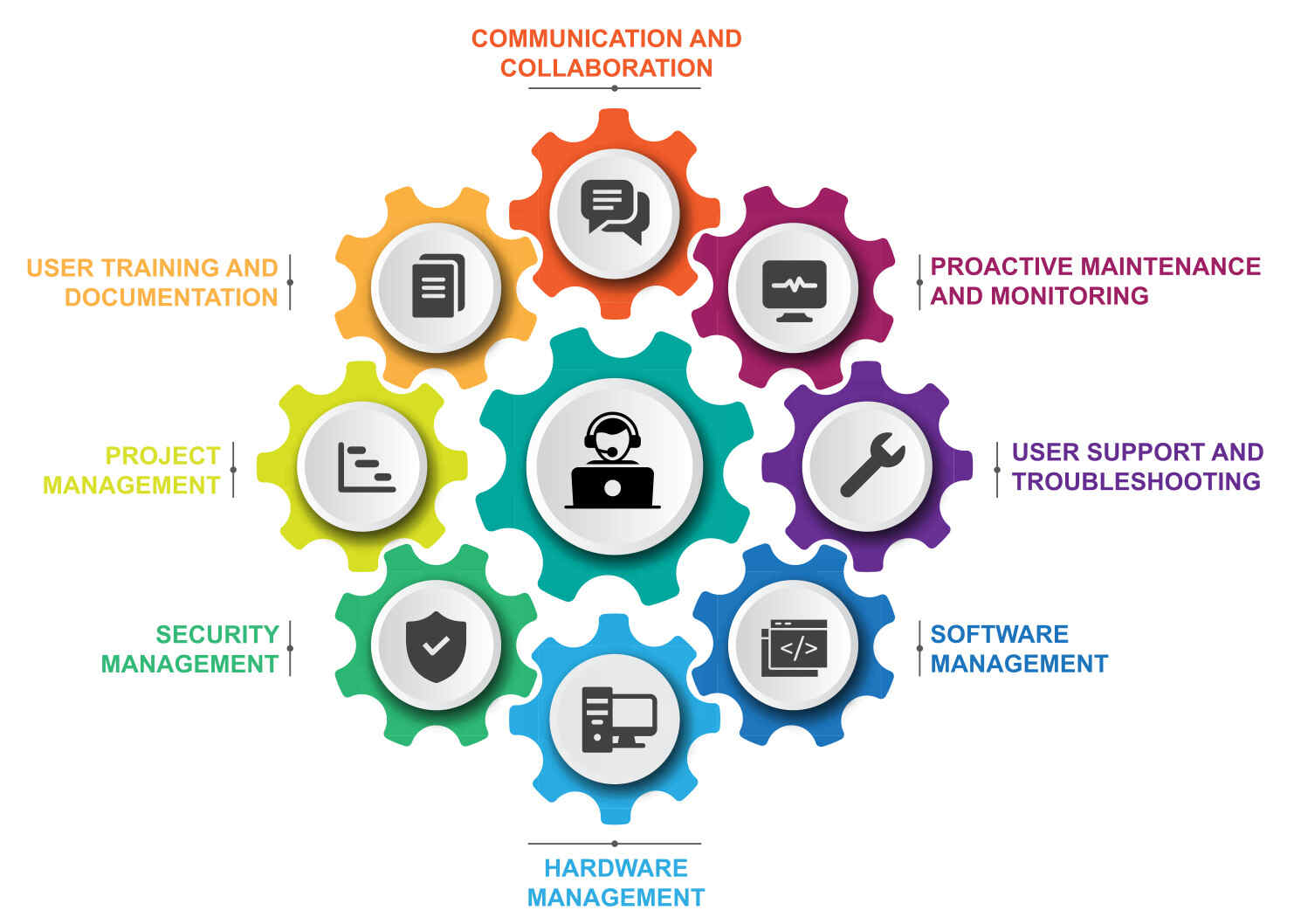IT support specialists play a vital role in ensuring the smooth operation of your business IT framework. They are responsible for maintaining and troubleshooting technical issues, ensuring business continuity, and enhancing productivity. With the rapid pace of technological advancements, having reliable and skilled IT support for business is crucial to address your organisation’s ever-evolving needs.
Benefits of Outsourcing IT Support
IT support outsourcing offers numerous benefits, including cost savings, access to specialists, scalability, improved efficiency, and round-the-clock support. By partnering with a managed services provider, you can avoid the costs associated with recruiting, training, and managing in-house IT support specialists. Additionally, you can leverage the expertise of specialists who are well-versed in various tech areas, ensuring that your IT infrastructure is always up-to-date and secure.
Key Functions of IT Support Teams
Your IT support team are responsible for ensuring that all employees can perform their tasks without technological hindrances, thereby boosting overall productivity. Key functions include:

1. Proactive Maintenance and Monitoring
They proactively monitor systems for low disk space and outdated software issues and perform regular maintenance tasks like patching vulnerabilities, updating anti-virus software, and optimising performance to ensure smooth operations.
2. User Support and Troubleshooting
IT support specialists are the initial point of contact for employees experiencing technical issues, ranging from password resets to troubleshooting software glitches and hardware malfunctions. They also provide guidance on software applications and company IT policies.
3. Software Management
This encompasses tasks like installing, configuring, and updating applications across devices, licensing, ensuring compliance, and evaluating new software for business suitability.
4. Hardware Management
IT support specialists oversee the health and functionality of company hardware. This involves setting up new employee workstations and devices, troubleshooting issues such as printer malfunctions or slow computers, and maintaining an inventory of hardware assets for timely upgrades.
5. Security Management
The team safeguards the company’s IT infrastructure from cyber threats. This involves implementing security measures such as firewalls, intrusion detection systems, and data encryption, educating employees on cybersecurity best practices like creating strong passwords, recognising phishing attempts, and responding swiftly to security incidents with effective mitigation strategies.
6. Project Management and Implementation
This often includes planning, deploying, and upgrading new IT systems or upgrades, collaborating with departments to translate business needs into technical requirements, selecting/configuring hardware and software, testing/migrating data, and training employees on new technologies.
7. User Training and Documentation
They create user guides, knowledge base articles, or training sessions to help employees effectively utilise various software applications and company IT resources.
8. Communication and Collaboration
IT support bridges technical aspects with business, communicating complex concepts to non-technical users and collaborating with departments to align IT with business goals.
Implementing IT Support Strategies
To ensure the effectiveness of your IT support for business, it is essential to implement the following:
- Self-service options: Provide employees with self-service options, such as comprehensive knowledge bases or FAQs, to empower them to find answers to common technical issues independently.
- Personalised support: Ensure that support is tailored to the unique needs of individual employees, particularly for complex or sensitive issues.
- Automation: Implement automation where possible to enhance efficiency, but also ensure that human intervention is available for complex issues.
- Regular maintenance: Perform regular maintenance checks to identify and address potential issues before they become major problems.
Enhancing Business Efficiency
An effective IT support strategy will lead to additional benefits across the organisation, ultimately facilitating a more efficient business. Take the following three examples:
- Ensuring business continuity: By proactively monitor systems failures can be prevented which means systems are always up and running.
- Enhancing productivity: Resolving technical issues promptly will prevent prolonged disruptions and boost overall productivity, and even morale.
- Safeguarding data: An IT support partner will play a key role in an organisations data management policy. Simply having a data/privacy policy is not enough. The IT department should help with the implementations of security protocols, conduct regular backups, and educate employees about safe practices to protect your organisation’s data.
Challenges and Solutions
Like all departments in an organisation, the IT support can also face challenges. There are some common challenges faced by IT support specialists and there are a number of tried and tested solutions to mitigate:
Cost-Effective IT Support Solutions
Outsourcing IT support to a managed services provider can be a cost-effective strategy for businesses, if it’s done in the right way. A well considered and solution eliminates the expenses associated with recruiting, training, and maintaining an in-house IT team. A poorly implemented solution could even increase costs.
Comparative Impact of Effective IT Support on company profits
Additionally, implementing automation can significantly increase efficiency by minimizing the need for manual processes, allowing staff to focus on more strategic tasks that contribute to business growth and innovation. (Take a look at the benefits the global management consultants firm Accenture achieved by embracing automation into their service desk). Both strategies can lead to improved operational efficiency and can be crucial in scaling businesses effectively.
Choosing the Right IT Support Provider
When choosing an IT Support provider it’s crucial to consider the following aspects of what they offer:
- Expertise: Ensure that the provider has expertise in various tech areas and can address your organisation’s specific needs.
- Scalability: Choose a provider that can scale to meet the evolving needs of your business.
- Cost-effectiveness: Evaluate the provider’s pricing model and ensure it aligns with your budget.
Streamline Your IT Framework with iTEK Computer Solutions’ Expert IT Support Specialists
iTEK Computer Solutions understands the unique challenges businesses in Cumbria and surrounding areas face today. We provide tailored, managed IT, technology, and telephony support to meet specific client needs. Our proactive team of engineers is dedicated to efficiently managing your systems, ensuring seamless operations, and securing your business’s future. Partner with iTEK’s IT Support Services for capable hands handling your IT needs. Contact us today to secure a more efficient and secure digital future.





